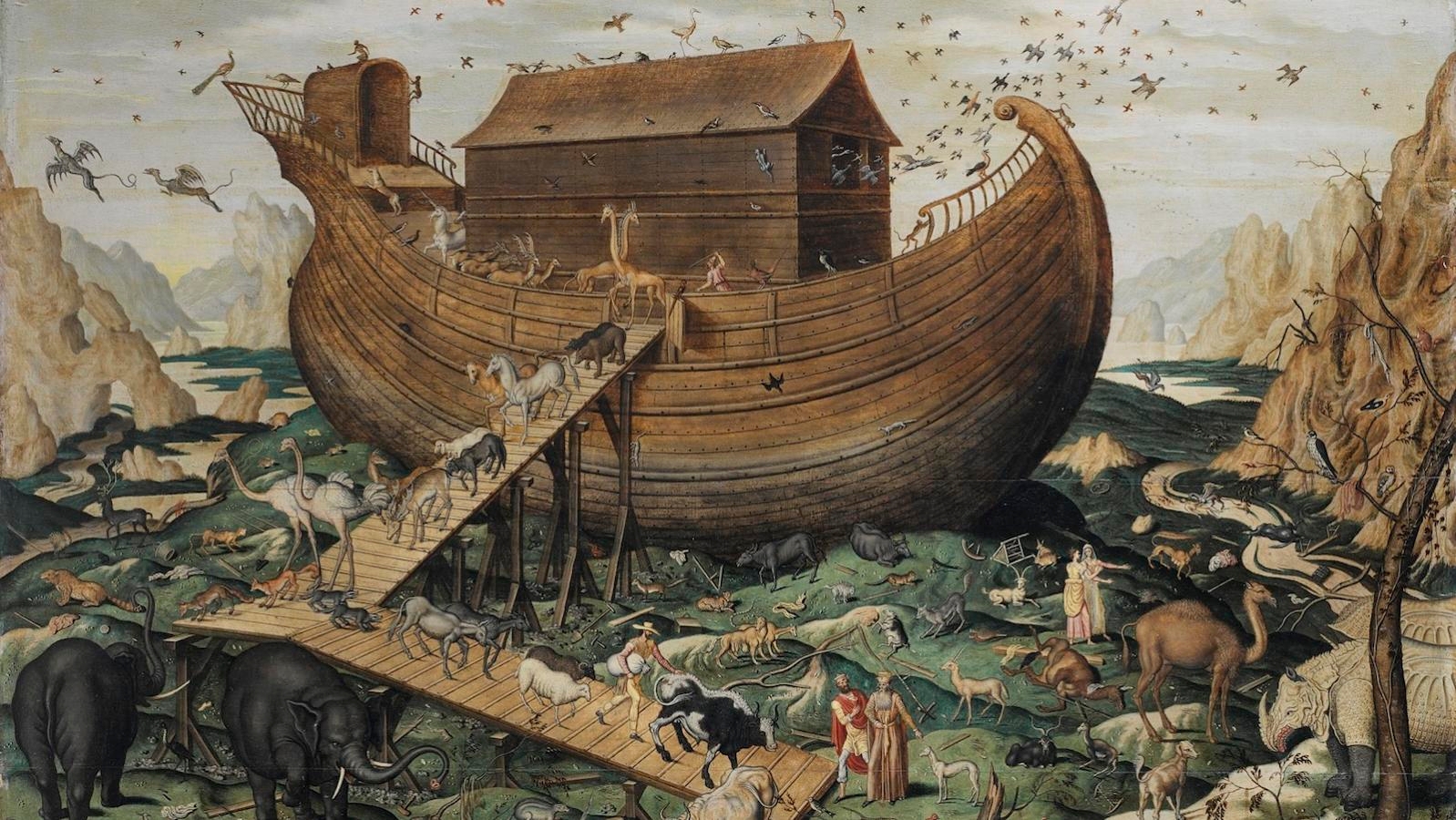In the ninth chapter of Genesis, we read this:
God speaks to Noah and his children as they exit the ark: ‘Behold, I establish my covenant with you, and with your seed after you.’ (Genesis 9:9)
Although rabbinic texts preserve various traditions about the details of this covenant, the reports the following:
The children of Noah were commanded with seven commandments: [to establish] laws, and [to prohibit] cursing God, idolatry, illicit sexuality, bloodshed, robbery, and eating flesh from a living animal (Sanhedrin 56a; cf. Tosefta Avodah Zarah 8:4 and Genesis Rabbah 34:8).
The Laws
- Do establish laws.
- Don’t curse God.
- Do not practice idolatry.
- Do not engage in illicit sexuality.
- Do not participate in bloodshed.
- Do not rob.
- Do not eat flesh from a living animal.
The Details
The prohibition against idolatry refers specifically to idolatrous worship, and not to beliefs. In later generations, Jews had to determine whether the prevailing religious cultures in which they lived were idolatrous. Since Islam is strictly monotheistic, Muslims have always been considered Noahides. Since the later Middle Ages, Jews have acknowledged that the Christian doctrine of the Trinity was not the same as idolatry, and they were also recognized as Noahides.
The prohibition against theft includes kidnapping, cheating an employee or an employer, and a variety of similar acts.
With your help, My Jewish Learning can provide endless opportunities for learning, connection and discovery.
The prohibition against illicit sexuality includes six particular prohibitions, derived from a single verse:
Noahides are prohibited from engaging in six illicit sexual relationships: with one’s mother, with one’s father’s wife, with another man’s wife, with his sister from the same mother, in a male homosexual union, and with an animal as it says, ‘Therefore shall a man leave his father…’ this refers to his father’s wife; ‘and his mother…” refers to the mother; ‘and cling to his wife…’ and not another’s wife; ‘wife…’ and not a homosexual union; ‘and become one flesh‘ (Genesis 2:24) excluding animals… (Maimonides, Laws of Kings, 9:5)
Eating flesh from a living animal is how the rabbis understood “But flesh with its life, which is its blood, you shall not eat” (Genesis 9:4). It has been suggested that the custom of eating an amputated limb of an animal was a way to keep the rest of the meat fresh in the days before refrigeration.
The Obligation to Create a System of Laws
According to the medieval philosopher and codifier Maimonides, the legal system which Noahides are required to set up is specifically to establish punishments for infractions of the other six Noahide laws (Laws of Kings 9:14).
Nahmanides, a medieval Bible commentator, understands the obligation more broadly:
In my opinion, the laws which the Noahides were to establish according to their seven commandments is not only to establish courts in each town, but that they were also commanded concerning theft, abuse, usury, labor relations, damages, loans, business, and the like, just as Israel was commanded to set up laws in these matters (Nahmanides, Commentary to Genesis 34:13).
Later authorities, including Rabbi Moses Sofer (1763-1839), claim that Maimonides did not exclude what Nahmanides had included, but that Maimonides considered all of these laws to be included under the prohibition of “theft.” Rabbi Naphtali Tzvi Yehudah Berlin (1817-1893) states that Nahmanides’ approach requires non-Jews to legislate on these matters, but the details and formulation of the legislation are left to their discretion.
Natural Law
The Noahide laws bear a striking resemblance to a separate rabbinic tradition that describes the commandments that would have been derived logically even if God had not included them in the :
‘You must keep my rulings’ (Lev. 18:4): These are the items which are written in the Torah which, had they not been written should logically have been written, such as the [prohibitions against] robbery, illicit sexuality, idolatry, cursing God, and bloodshed.” (Sifra, Ahare Mot, section 140)
The overlap here of five of the seven laws enumerated for Noahides indicates that they may have been understood as a sort of universal, natural morality. This is the way some modern philosophers, such as Hermann Cohen, understood them.
Indeed, based on the Talmudic discussion, Maimonides states:
Six items were commanded to Adam: concerning idolatry, blasphemy, bloodshed, illicit sexuality, theft, and laws…God added to Noah, the law of not eating from the flesh of a live animal.” (Maimonides, Laws of Kings 9:1)
The association of these laws with Adam implies that they were established as part of the creation of the natural world.
Laws for Non-Jews Under Jewish Rule
A conversation in tractate Sanhedrin assumes that Jewish courts should enforce the Noahide laws. Therefore, later authorities, most notably Maimonides, understood these laws as describing what Jews should require of non-Jews living under Jewish rule. Since Maimonides saw revelation as the clearest form of reason, it would be folly from his perspective, for non-Jews living under Jewish rule to rely upon their own inadequate reasoning powers to determine law when they have access to the superior reasoning of revelation.
Indeed, according to Maimonides, it is unacceptable for non-Jews living under a Jewish authority not to accept the Noahide laws:
If someone from the other nations wants to convert [they may] as it says ‘[the law is the same] for you, for a stranger’ (Numbers 15:15). But if they do not want to, we do not compel them to accept the Torah and the commandments. Moses did, however, command in the name of God to compel all people to accept the Noahide laws…” (Laws of Kings 8:10)
Maimonides’ approach, however, is much disputed among the classical commentators. Some interpreters of Maimonides have argued that he meant to obligate the Jewish court, but not individual Jews, to compel non-Jews to comply with the Noahide laws. Others have argued that the entire issue is irrelevant until the days of the Messiah. Nevertheless, it seems clear that Maimonides intended that whenever it was possible to compel observance, Jews should make an effort to do so.
Other medieval authorities, rather than attempting to re-interpret Maimonides’ statement, simply disagreed. Rabbi Abraham ibn Daud clearly rejects any obligation to compel observance of the Noahide laws, even in a situation where Jews have subjugated non-Jews in war. This seems to be the opinion of Rashi, Tosafot, Nahmanides, and Rashba, as well. In dealing with individual non-Jews as employees or slaves, none of the legal codes, aside from Maimonides’, mentions an obligation to impose Noahide laws or to punish non-Jews for violation of the Noahide laws.
By way of contrast, when Jews are likely to sin, other Jews are obligated to try and prevent that sin through intervention and education. In general, in modern times, no such obligation is mandated towards non-Jews who violate the Noahide laws. A notable and forceful exception is the opinion of the late Rabbi Menachem Mendel Schneerson, the last leader of Chabad-Lubavitch Hasidism. Schneerson wrote:
We must do everything possible to ensure that the seven Noahide laws are observed. If this can be accomplished through force or through other kinder and more peaceful means through explaining to non-Jews that they should accept God’s wishes [we should do so]…Anyone who is able to influence a non-Jew in any way to keep the seven commandments is obligated to do so, since that is what God commanded Moses our teacher (“Sheva Mitzvot Shel Benai Noach,” Hapardes 59:9 7-11, 5745)
Conclusion
That Jews perceive non-Jews as bound by a set of laws–even if they are not bound by the full range of Torah law–is a significant statement. The expectation that non-Jews will set up their own system of justice became the basis for peaceful interactions between Jews and non-Jews. The Noahide laws separated humanity after the flood from the lawless violence which brought God to the point of destroying the world. The Noahide laws stand as a testament to the Jewish belief in the need for the rule of law to protect all peoples.



